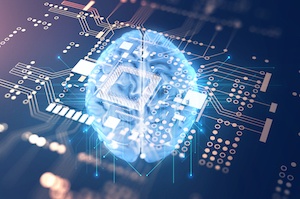The Future of Medicine: Artificial Intelligence, Physicians and Patients
 Doctors worry that artificial intelligence (AI) will replace physicians and surgeons. Visions of robots performing surgery, doing routine checkups and coordinating care without humans are common imaginings of the future with AI. But new and developing technologies are instead showing us a future that has AI and humans working side by side, giving us more reasons than not to welcome AI in the healthcare field.
Doctors worry that artificial intelligence (AI) will replace physicians and surgeons. Visions of robots performing surgery, doing routine checkups and coordinating care without humans are common imaginings of the future with AI. But new and developing technologies are instead showing us a future that has AI and humans working side by side, giving us more reasons than not to welcome AI in the healthcare field.
According to a study from The New England Journal of Medicine, we are facing a whopping global shortage of 4.3 million doctors and nurses. Poorer countries feel this scarcity more acutely while countries like the United States suffer more in terms of rising healthcare costs and less doctor-to-patient contact. AI technologies promise not only to respond to the growing gap, but also help the more human aspects of health care thrive in considerable ways.
Alleviating Administrative Burdens
Administrative tasks are the low-hanging fruit on the AI tree. We already know that electronic health records have been a bigger burden on physicians than is healthy for productivity or patient care. AI can assist in alleviating administrative burdens by more easily taking patient histories, organizing prior authorizations, and navigating the payer landscape so doctors know if a treatment is covered by insurance.
Embedding AI into EHRs also enables a higher and faster output of protocols. AI can build a protocol in just 10 days as opposed to a typical year it takes for a physician team to do the same work. Marc Probst, a chief information officer at an NPO health organization in Salt Lake City, Utah, stated that with AI, his team soon would be able to build thousands of protocols and embed them into their EHR system.
Increased Patient Support
One of the biggest assets of integrating AI is increasing the likelihood of more individualized patient care. With hundreds of research papers published daily, AI technology can extract information more quickly for physicians. Physicians can apply that information to determine if there are new therapies that would work for a patient more effectively than traditional treatments.
An Additional Pair of Eyes
While advances in AI have short-term goals like taking over routine administrative tasks, the long-term implications are even more exciting. Radiology is an excellent example of a field primed to benefit tremendously from AI technology. In the 1980s, a radiologist had to read only 20 to 50 images per scan; that amount has increased to up to 1,000. Reading images can be a tedious and error-prone task. Implementing AI as a diagnostic aid can make the job more efficient by quickly identifying specific areas that need closer examination.
Geoffrey Hinton, a computer scientist at the University of Toronto, says that many of these data-heavy problems will be solved by “deep learning,” and he sees a future in which algorithms learn to “read X-rays, CT scans, and MRIs of every variety…[and in the future] will make pathological diagnoses.”
Physicians should keep an open mind as we adjust to a new world of AI, whose integration can help improve the efficiency of physicians and the quality of patient care. While AI may seem threatening, doctors who embrace working with AI will reap the benefits of a future of medicine that’s already here.




